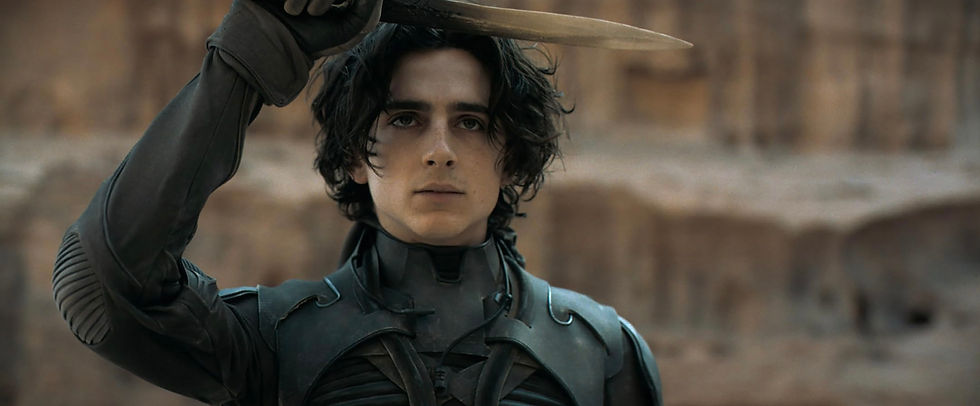Dune & Determinism vs Free Will
- Scott Barnard

- Jul 15, 2025
- 3 min read
Updated: Jul 22, 2025

Denis Villeneuve’s Dune (2021) is a richly layered science-fiction epic that not only visualises the mythic and political depth of Frank Herbert’s source material but also offers a cinematic meditation on the philosohical conflict between determinism and free will. While the film explores a range of complex themes such as environmental colonialism, power and religion, and messianic mythology, its philosophical core lies in Paul Atreides’ confrontation with a fate that appears both inevitable and constructed. Villeneuve uses the cinematic codes and conventions of mise-en-scène, cinematography, editing, and sound design to interrogate the tension between agency and destiny, positioning Paul as a character whose growing power paradoxically limits his freedom.

This is most evident in the scene where Paul and Lady Jessica arrive on Arrakis and encounter the Fremen’s belief that Paul is the prophesied “Lisan al-Gaib.” Through wide-angle cinematography and reverent framing, Villeneuve constructs Paul as a mythic figure, elevated both literally and figuratively. The use of close-ups and stillness in Paul’s performance contrasts sharply with the urgency of the Fremen, underscoring his internal resistance to the external role he is expected to embody. Hans Zimmer’s score elevates this moment with otherworldly vocals, creating a religious tone that blurs reality and belief suggesting that Paul’s perceived destiny has begun to subsume his individual will. The prophecy itself is revealed to be a manufactured tool of control by the Bene Gesserit who have seeded myths throughout the galaxy to manipulate entire populations positioning prophecy not as truth, but as a strategic form of determinism. Villeneuve critiques this manipulation subtly, using long, quiet takes to dwell in the discomfort of inherited power, rather than celebrating it.
This idea, that free will is an illusion, and that most decisions are shaped by causes outside the self, is widely supported by modern determinist thinkers. Neuroscientist Sam Harris argues that even the feeling of choice arises from unconscious brain activity, long before we become aware of our decisions. Similarly, Yuval Noah Harari warns that in an age of surveillance capitalism and behavioural prediction, human “choices” can be anticipated, manipulated, and even overwritten by algorithms. This subject is shockingly presented in the documentary, The Social Dilemma, that shows us how easily we are psychologically manipulated by algorithms that determine our actions and behaviours. Choice is an illusion. Dune reflects this viewpoint through its recurring visions in which Paul sees not only future events but the consequences of choices he has not yet made. These prescient sequences are filmed with desaturated colour palettes and slow motion, distancing the viewer from linear time and placing Paul’s consciousness into a causal loop. The visual coding of these visions, use of soft focus, overlapping voices, and fluctuating pacing, evokes the disorientation of a character trapped in a future already unfolding. As Harari might argue, Paul is not acting freely but enacting a pattern that was inevitable given his genetics, religious mythos, and social position.

The manipulation of prophecy within the narrative further illustrates the illusion of choice. Paul is not chosen at random; he is the product of generations of Bene Gesserit breeding, cultural engineering, and psychological conditioning. Even his messianic title is a manufactured artefact of political control. The audience watches Paul struggle with this knowledge, especially in a pivotal moment where he realises that in order to save the Fremen, he may have to become the very force of destruction (a jihad) he fears. The mise-en-scène in these moments, barren desert backdrops, lonely silhouettes, and subdued lighting, visually reinforce his isolation. Paul becomes not a saviour of the people but a vessel of inevitability.

The film ends not with triumph but with Paul’s submission to the Fremen’s expectations - an act of surrender to larger forces than individual will. In this sense, the film aligns more closely with existential cautionary tales like Ex Machina and Arrival (also directed by Villeneuve), in which characters wrestle not only with technological or alien systems, but with the limits of consciousness and agency.

Ultimately, Dune positions free will not as an innate human right, but as an illusion sustained by culture, belief, and ignorance of deeper systems. By aligning form and theme, Villeneuve invites the viewer to experience determinism not as a concept but as an emotional state - a slow, creeping erosion of agency beneath the weight of prophecy, power, and history. Paul’s journey is not heroic in the traditional sense, but tragic: a young man who sees the path laid out before him and cannot escape it. In drawing connections to real-world systems of influence and contemporary philosophical thought, Dune invites critical reflection on how deeply conditioned even our most personal decisions might be. Free will is an illusion - our thoughts, intentions, and actions arise from causes such as genetics, upbringing, brain processes - all of which we’ve had no conscious control over.


